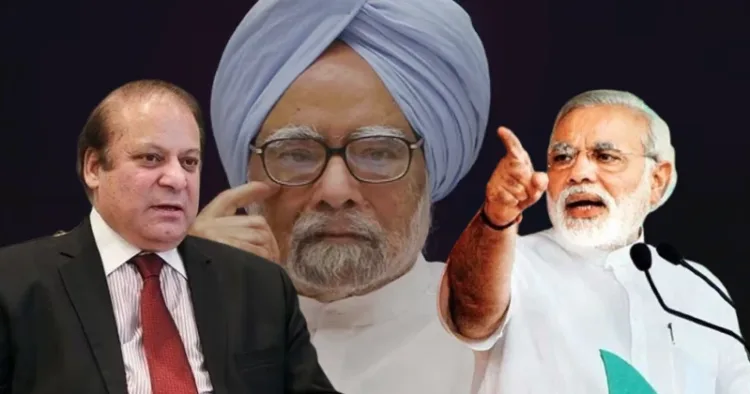In 2013, a diplomatic storm was erupted when then-Pakistani Prime Minister Nawaz Sharif referred to Indian Prime Minister Manmohan Singh as a “dehati aurat” (village woman) during an off-the-record interaction with journalists in New York. This disparaging remark not only triggered outrage across India but also elicited a powerful and impassioned response from Narendra Modi, who was then Gujarat’s Chief Minister and the Bharatiya Janata Party’s prime ministerial candidate.
Speaking at a public rally in Delhi, a visibly agitated Modi took strong exception to Sharif’s offensive comment, describing it as an affront to the dignity of the Indian Prime Minister and the nation as a whole. “Nawaz Sharif, what is your aukaat (standing) to address the Prime Minister of a nation of 125 crore people in such language?” said Modi, as the crowd erupted in applause.
He underscored the gravity of the insult, stating, “This is not just an insult to Dr. Manmohan Singh but to every Indian. We may criticise his policies domestically, but we will not tolerate any foreign leader disparaging the head of our government.” Modi’s remarks resonated with his audience and reinforced the sentiment of national pride, which he portrayed as being undermined by Sharif’s comment.
“He is not just an individual; he represents 1.25 billion Indians,” Modi declared, making it clear that any attack on the Prime Minister was an attack on the pride and sovereignty of India. “How dare you address our Prime Minister in such demeaning language? There cannot be a bigger insult to the dignity of our nation.”
The rally erupted in applause as Modi continued, “Within our country, we may have political differences with Dr. Manmohan Singh. We may criticise his policies. But when it comes to a foreign leader insulting him, the entire nation must stand united. This nation of 1.25 billion people will never tolerate such an insult.”
Sharif’s comment came during his discussion with Indian journalist Barkha Dutt and senior Pakistani journalist Hamid Mir. He allegedly expressed disappointment over Manmohan Singh’s diplomatic interactions with US President Barack Obama, likening them to complaints made by a “village woman.” While the conversation was initially off the record, the remarks soon made headlines, triggering widespread condemnation across India.
The insult to India’s Prime Minister, particularly at a time when Singh and Sharif were scheduled to meet on the sidelines of the UN General Assembly, was seen as a calculated provocation. Senior Pakistani journalist Hamid Mir later confirmed the remarks, further fueling the outrage.
Modi’s speech served as a rallying cry for Indians across political lines. By defending Singh against Sharif’s disparaging remarks, Modi positioned himself as a leader who would fiercely protect India’s honor and sovereignty on the world stage. His words struck a chord with the public, drawing a sharp contrast between his unapologetic nationalism and the Congress government’s perceived inaction in the face of Sharif’s insult.
The BJP criticised the Congress for failing to issue a strong rebuttal to Sharif’s comment. “The Congress party’s silence on this grave insult to the office of the Prime Minister shows their lack of resolve,” BJP leaders declared, sharing clips of Modi’s impassioned speech on social media to underscore their point.
The “dehati aurat” episode was not an isolated incident. It came against the backdrop of rising tensions between India and Pakistan, with both nations accusing each other of fostering terrorism and violating territorial sovereignty. Modi, in his speech, linked Sharif’s remarks to Pakistan’s broader pattern of hostility, calling for a decisive and united response to counter such provocations.
At the United Nations, Indian External Affairs Minister S. Jaishankar had earlier called Pakistan the “epicenter of terrorism,” citing its long-standing support for terror groups. This led to an inflammatory response from Pakistan’s Foreign Minister, Bilawal Bhutto-Zardari, who launched a personal attack on PM Modi, referring to him as the “butcher of Gujarat.”
“At the end of the day, the world is not stupid, the world is not forgetful. And the world does increasingly call out countries and organisations and people who indulge in terrorism,” Jaishankar said.
Prime Minister Narendra Modi has often expressed his regard for Dr. Manmohan Singh’s intellectual prowess and his role in shaping India’s economic policies. On his 90th birthday in 2022, PM Modi took to social media to wish him well, referring to him as “a respected figure in Indian politics.” Similarly, during parliamentary debates, Modi has acknowledged Singh’s legacy as an economist and his pivotal role in liberalising India’s economy in 1991.
Dr. Sardar Manmohan Singh, passed away on December 26 evening at the age of 92 due to age-related ailments.


















Comments